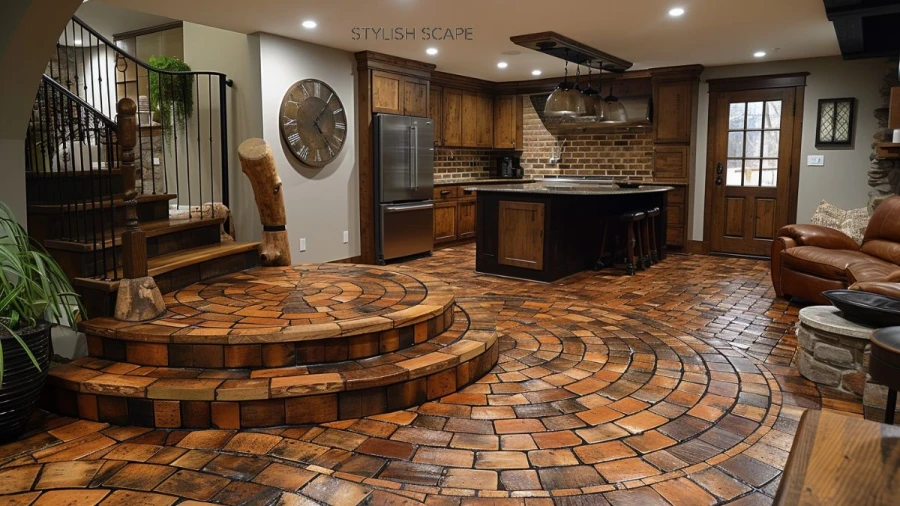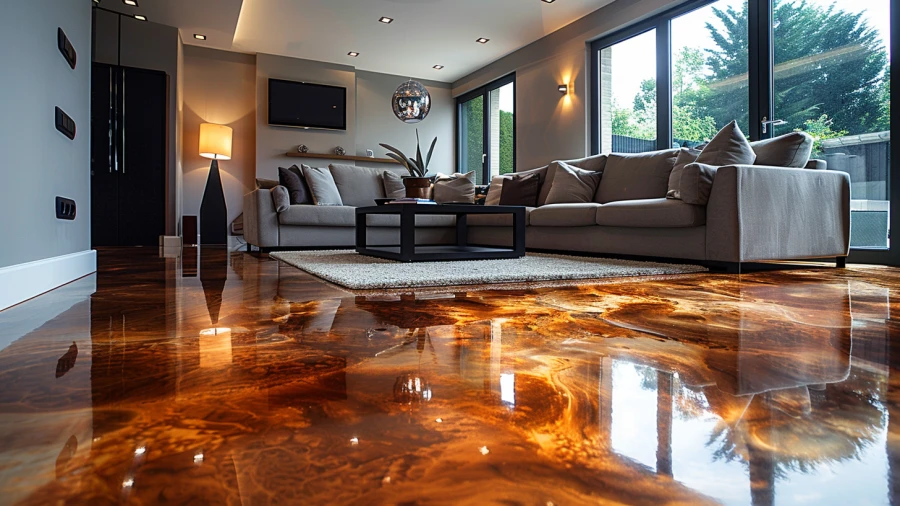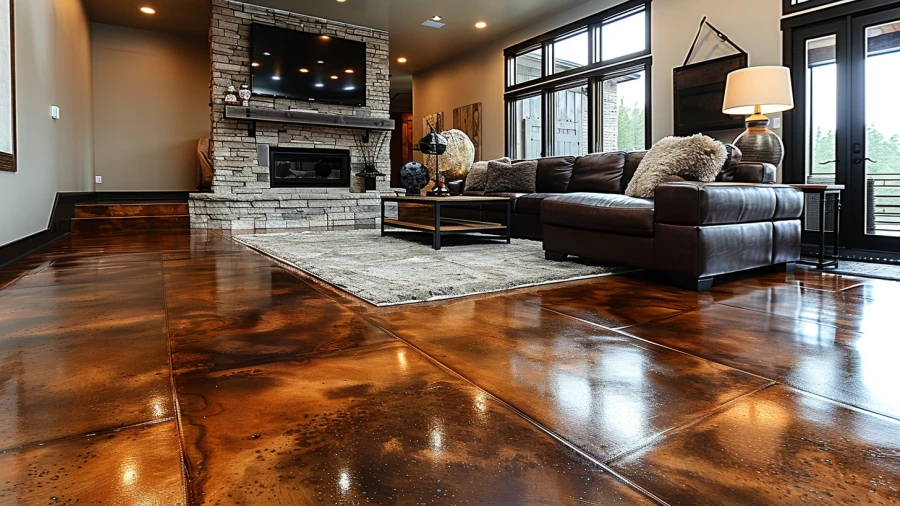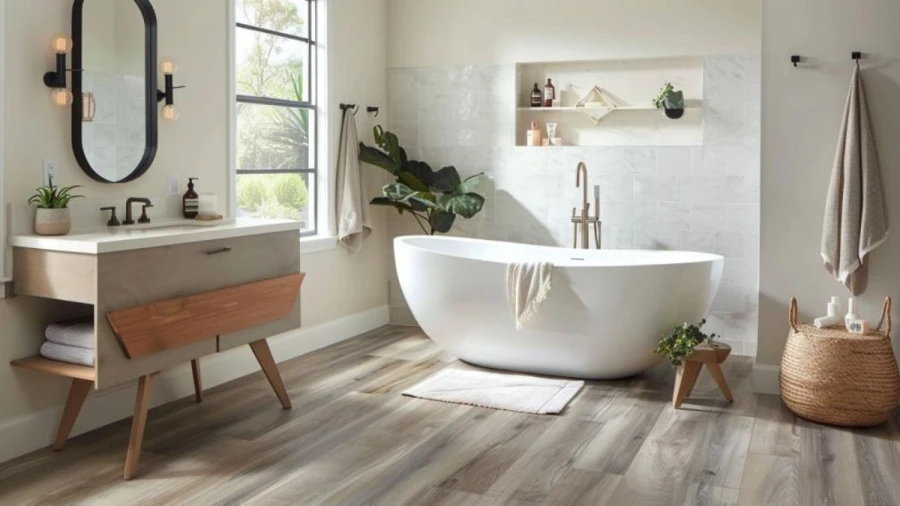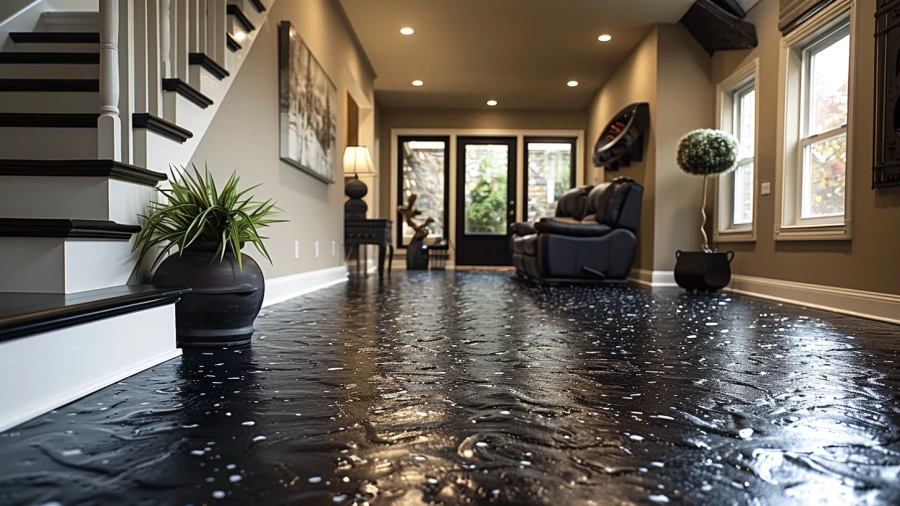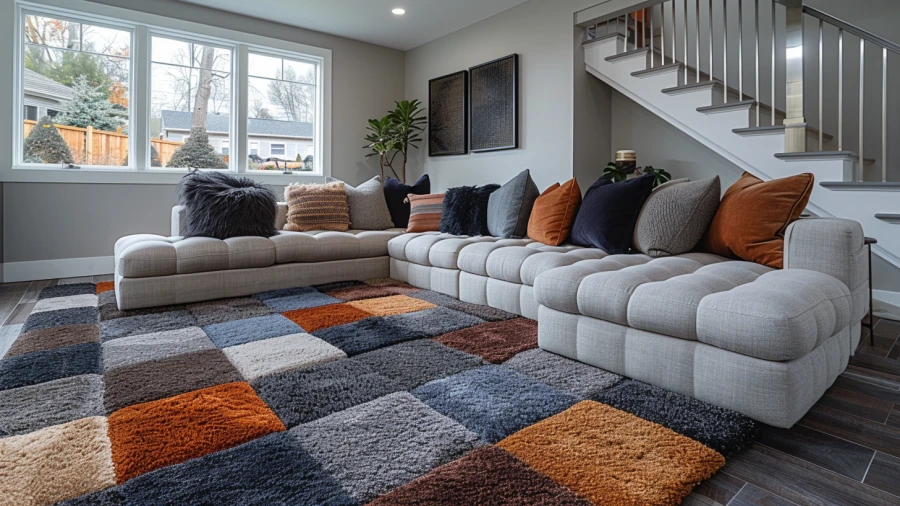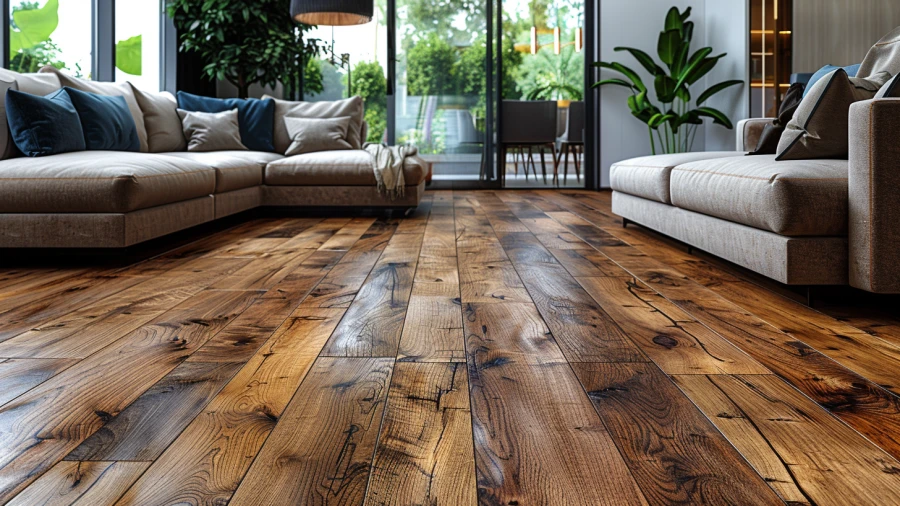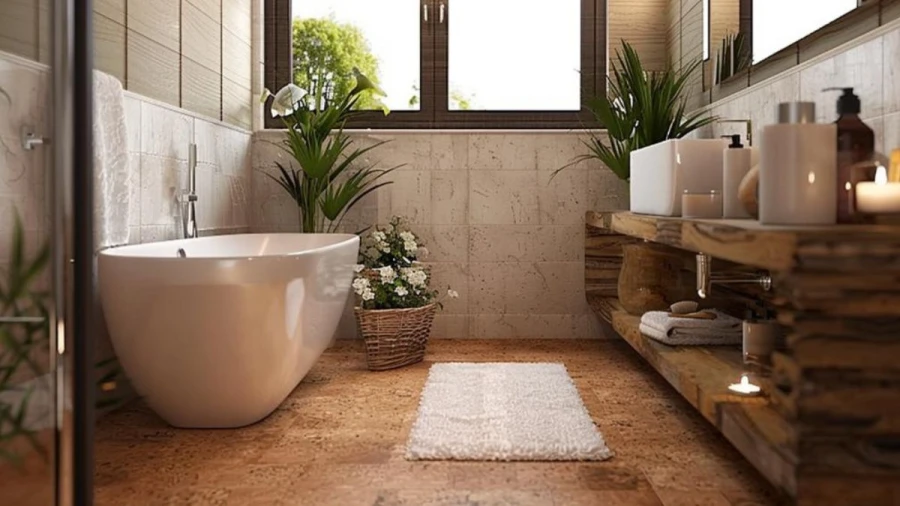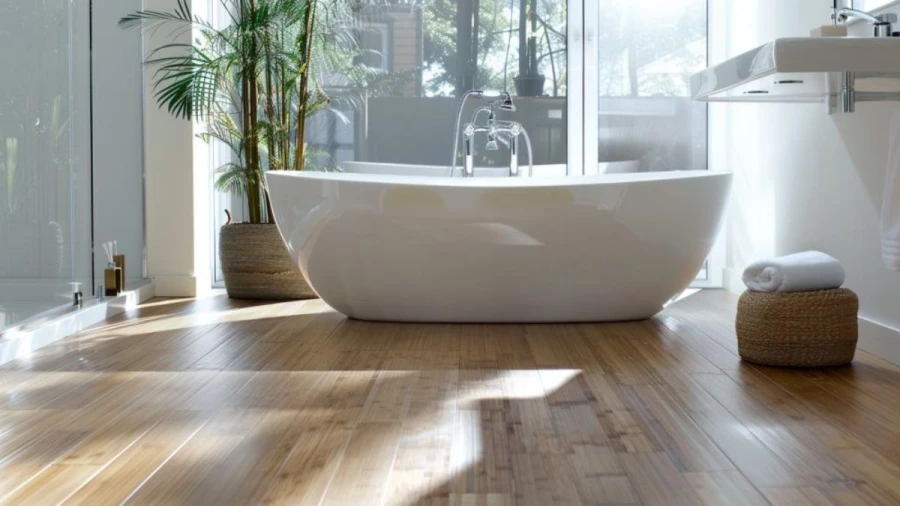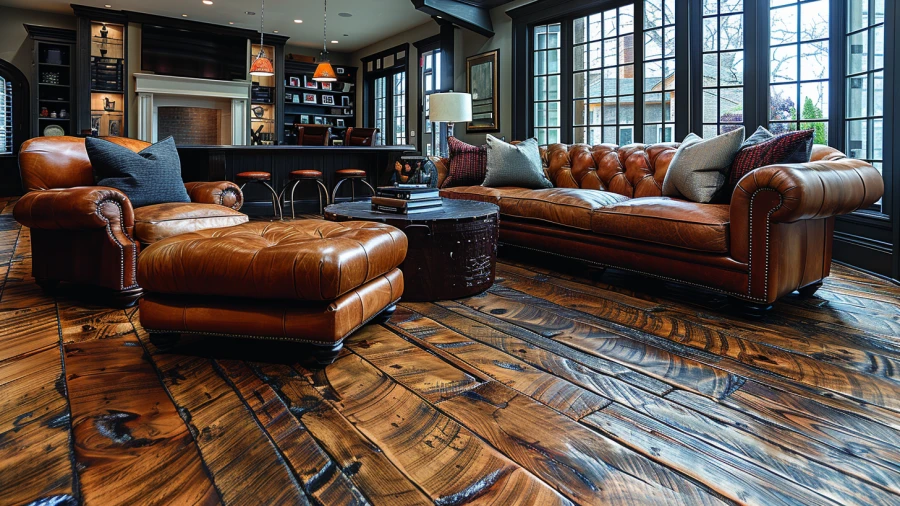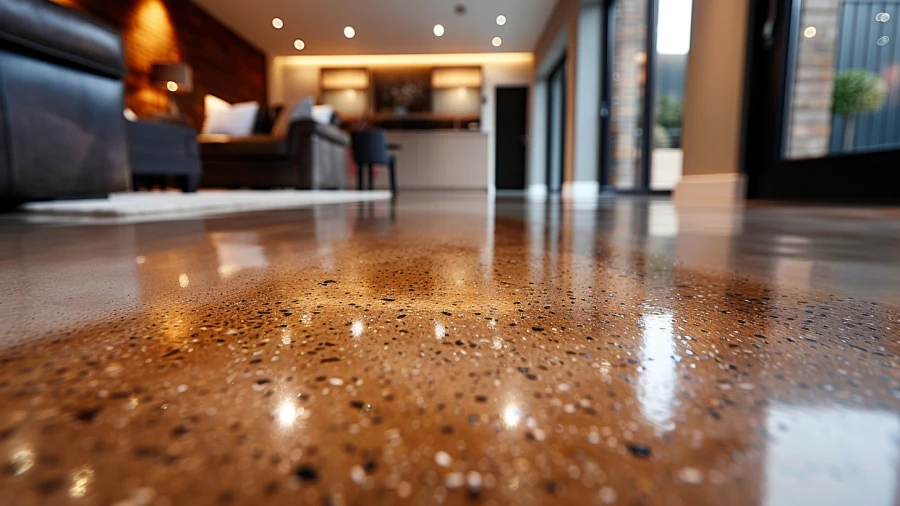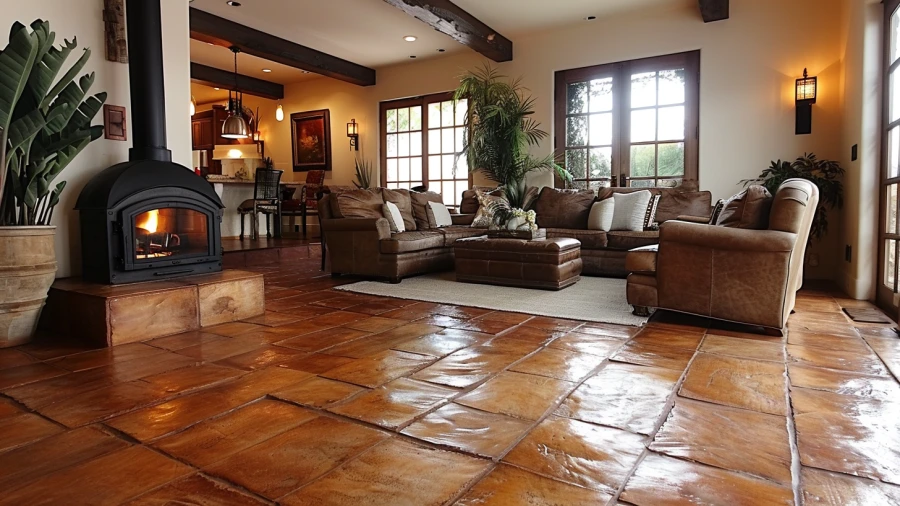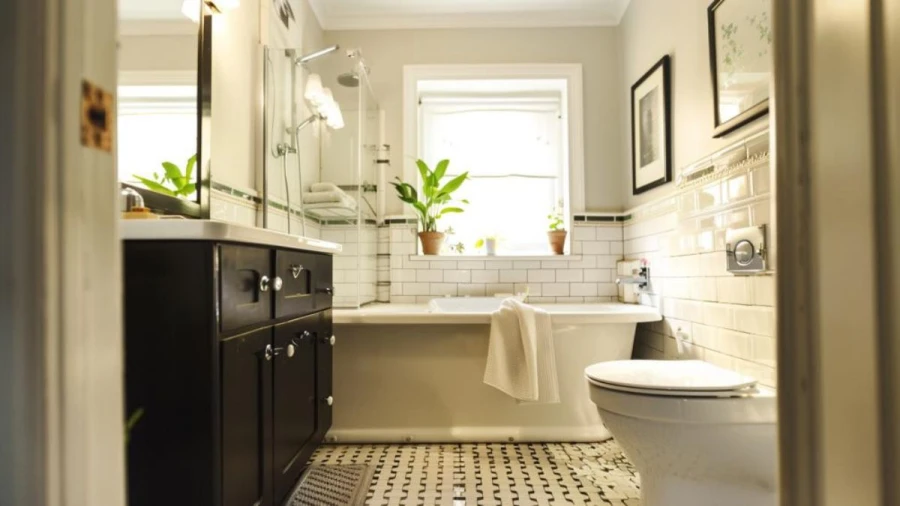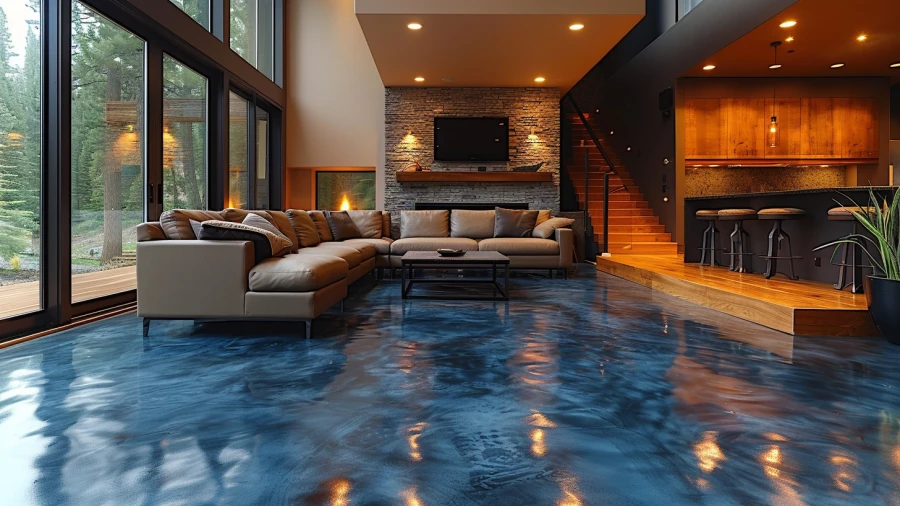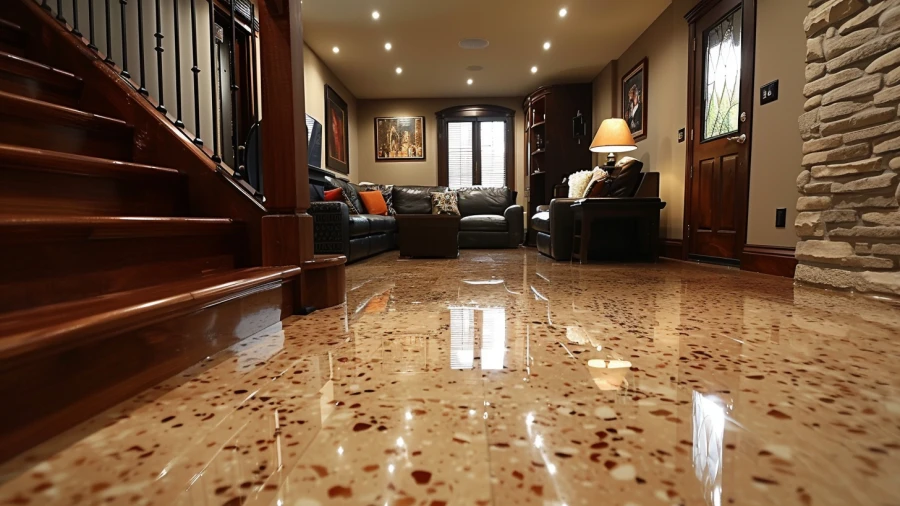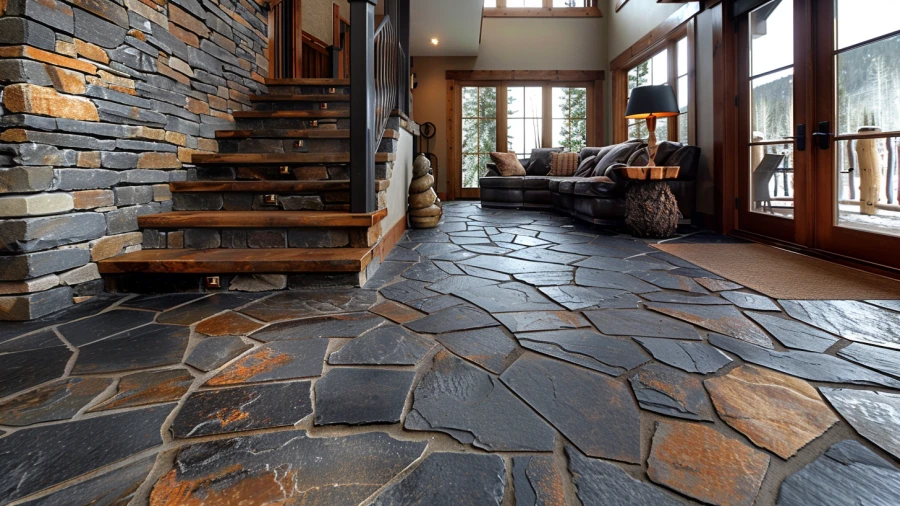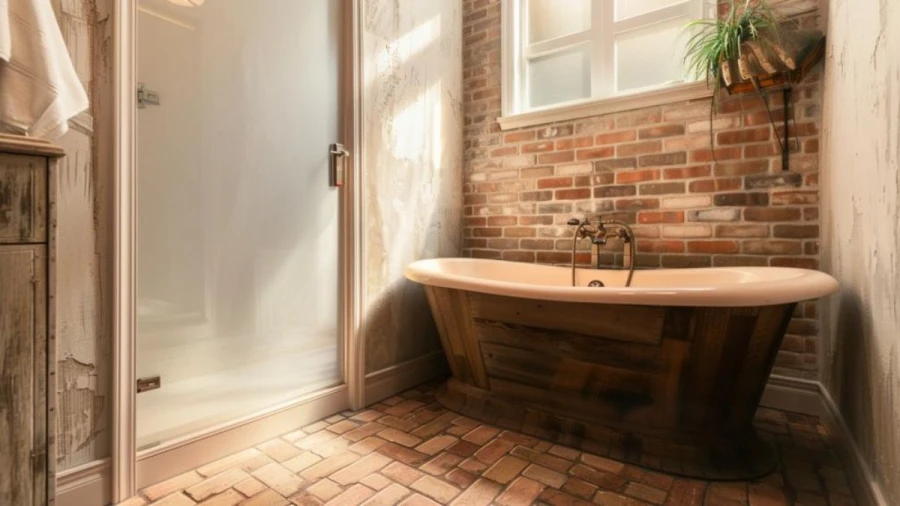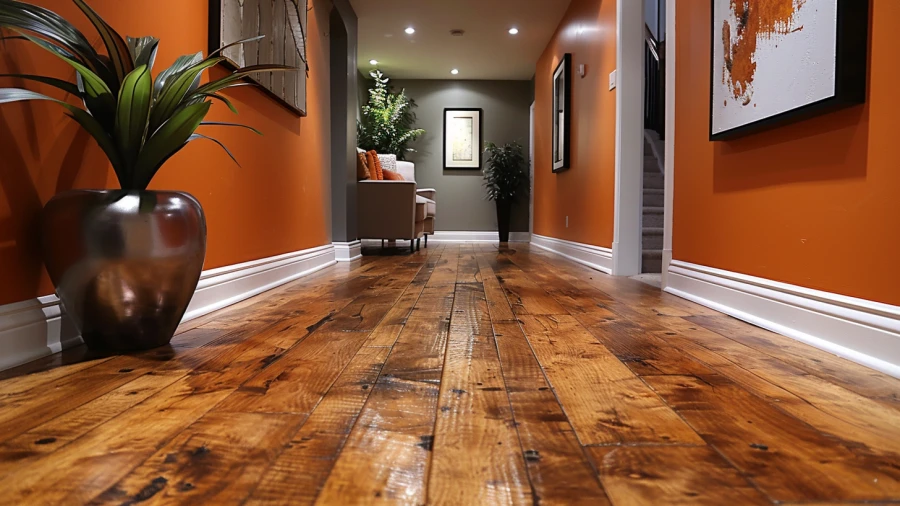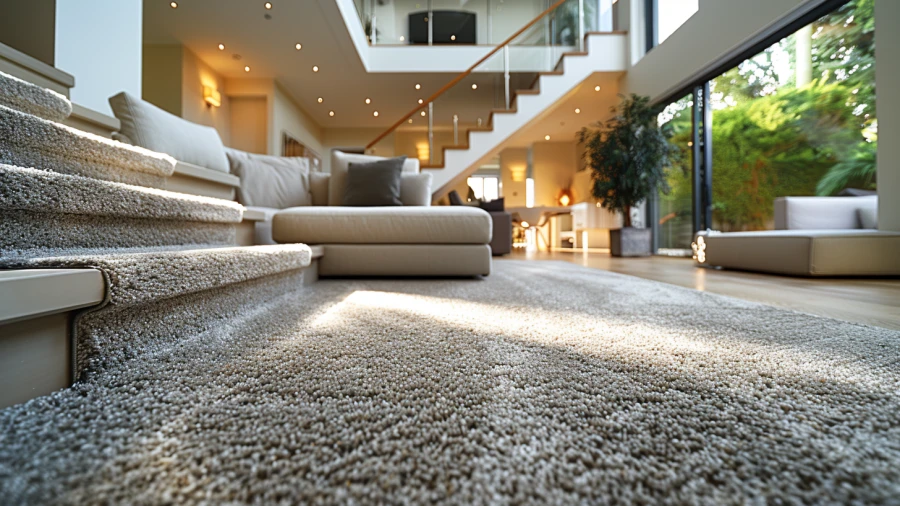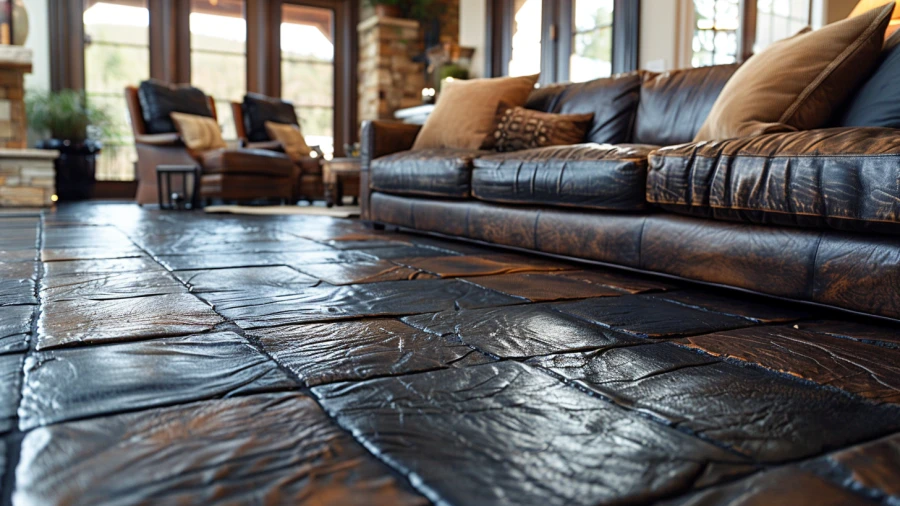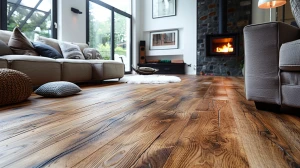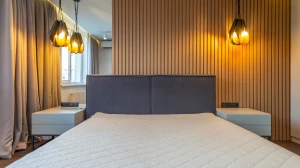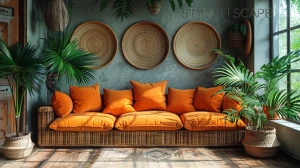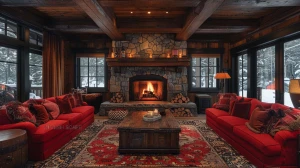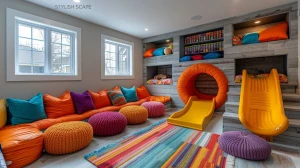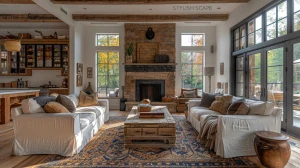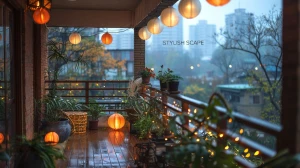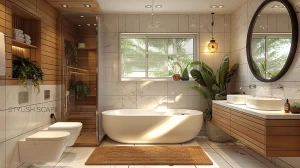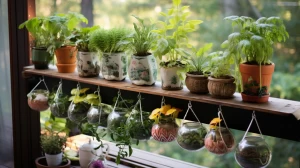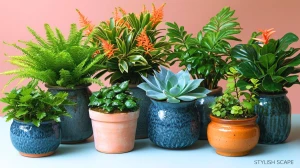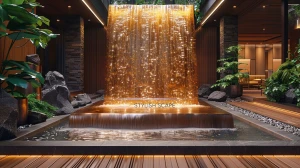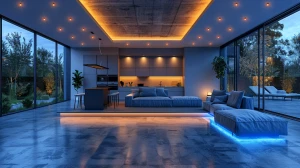
20 Unique Basement Flooring Ideas to Transform Your Space
Explore several Basement Flooring Ideas for remodeling your area. Discover solutions that strike the ideal balance between style, durability, and comfort for the perfect Unique Basement Flooring Idea and makeover, from resilient vinyl planks and sleek epoxy to warm carpet tiles and eco-friendly cork.
by B Kishwar
Updated Jun 10, 2024
On This Page
- Basement Flooring Ideas
- Epoxy Flooring
- Stained Concrete
- Vinyl Plank Basement Flooring
- Rubber Flooring
- Carpet Tiles Basement Flooring
- Engineered Hardwood
- Cork Basement Flooring
- Bamboo Flooring
- Laminate Basement Flooring
- Polished Concrete
- Ceramic Tile
- Luxury Vinyl Tile (LVT)
- Linoleum Basement Flooring
- Painted Concrete
- Terrazzo
- Stone Tile
- Brick Pavers Basement Flooring
- Plywood Planks
- Carpet
- Leather Basement Flooring
- How to Select the Best Basement Flooring?
Basement Flooring Ideas
Because of the particular conditions in your basement, such as higher moisture levels and the requirement for durability, choosing the proper flooring is essential. Popular choices include vinyl plank flooring for its durability and wood-like appearance, and epoxy flooring for its elegant, water-resistant finish. Concrete that has been polished or stained can look industrial chic while requiring little upkeep.
Heat-producing carpet tiles are simple to replace in the event of damage. Natural comfort and appeal are enhanced by eco-friendly materials like bamboo and cork. All of the options combine design, dependability, and low maintenance requirements to turn your basement into a cozy, useful area that suits your tastes.
Epoxy Flooring
Epoxy flooring is a great option for basements because of its elegant, contemporary design and long lifespan. With this kind of flooring, the concrete is coated with a resin and hardener mixture to provide a glossy, water- and stain-resistant surface. Epoxy flooring can be customized to fit any style preference due to its wide range of colors and patterns.
Its extremely durable and easily cleanable non-porous surface makes it perfect for high-traffic areas. Also, epoxy resists mold and mildew, which is important because moisture can be problematic in basements. To improve safety in rainy situations, anti-slip chemicals can also be added to it.
Stained Concrete
For modern or industrial-style basements, stained concrete flooring establishes a sophisticated, rustic appeal that is perfect. Using this flooring process, concrete is stained using acid-based stains that react with the minerals to produce patterns and colors that are distinct from one another. The end result is a unique floor with deep tones that resemble real stone.
Water and stain resistance, longevity, and minimal maintenance are all features of stained concrete. As it does not retain moisture, it's a great option for basements since it helps to stop the growth of mold. Its smooth surface can be sealed to improve its look and guard against scratches, making it both functional and visually beautiful.
Vinyl Plank Basement Flooring
Vinyl plank flooring's adaptability and water resistance make it a great choice for basements. These planks provide a fashionable appearance at a fraction of the price of actual stone or wood. Vinyl planks can be installed over pre-existing flooring with ease because they frequently have a click-and-lock mechanism. Also, they are extremely durable, holding up well against high foot traffic and possible moisture problems in basements.
All that has to be done for maintenance is the occasional cleaning and routine sweeping. Vinyl plank flooring, which comes in an extensive array of shades and designs, enables homeowners to attain a luxurious appearance without having to pay a premium price for it.
Rubber Flooring
Rubber flooring is a great option for basements, particularly if the area is utilized for play or exercise. This kind of flooring is well-known for being resilient and comfortable underfoot, offering a soft, cushioned surface that attenuates sound and cushions hits. Rubber flooring is water-resistant, which makes it perfect for basements where there may be moisture issues.
It also requires little maintenance, usually only a damp mop for spills and routine cleaning. Rubber flooring comes in a variety of hues and designs and can be both practical and aesthetically pleasing. It is a secure and useful option for any basement environment because of its strength and capacity to withstand slips.
Carpet Tiles Basement Flooring
For basements, carpet tiles provide a warm and adaptable flooring option. These square carpet portions are simple to install and can be placed in a variety of ways. The peel-and-stick or adhesive backing is frequently used. Carpet tiles are perfect for converting a basement into a cozy living area since they offer insulation against sound and temperature.
It is not necessary to replace the entire floor if a tile becomes broken or discolored because it is simple to replace. They allow for infinite customization because they are available in a vast array of colors, textures, and designs. Carpet tiles are a useful and fashionable option for basement flooring because they are also rather simple to maintain and clean.
Engineered Hardwood
For basements, engineered hardwood flooring is a chic and long-lasting option. Engineered hardwood is more stable and resistant to temperature and humidity fluctuations than solid hardwood because it is constructed of layers of wood that are joined together and covered in hardwood veneer conditions that are frequently encountered in basements. It has a rich, warm appearance just like solid wood, yet it is less prone to shrink or warp.
Click-lock planks that can be floated over a moisture barrier make installation simple. Engineered hardwood is versatile enough to go with any type of decor, coming in an array of wood species, finishes, and board widths. It blends style and functionality, maintaining a lovely appearance with routine sweeping and infrequent damp mopping.
Cork Basement Flooring
For basement floors, cork flooring is a cozy and environmentally responsible choice. Constructed from the bark of the cork oak tree, it offers a warm, cozy, and naturally mold, mildew, and pest-resistant surface that is perfect for basement conditions. Because of its superior insulating qualities, cork flooring lowers noise levels and aids in maintaining a constant temperature.
It comes in a variety of colors and patterns, both in tiles and planks, that can give your room a special appearance. Cork is simple to install and can be used to manage possible wetness by floating it over a moisture barrier. Because it requires little upkeep just routine sweeping and damp mopping cork is an economical and environmentally friendly material.
Bamboo Flooring
For basements, bamboo flooring is a fashionable and eco-friendly choice. Bamboo is an environmentally friendly grass that grows quickly and has the durability of hardwood but with a look similar to it. Because engineered bamboo is stable in varying humidity conditions, it is especially well-suited for basements. Engineered bamboo is composed of layers of bamboo fused together.
It offers a variety of aesthetic possibilities with different treatments, including natural, carbonized (darker), and strand-woven (very durable). Bamboo flooring requires only basic upkeep, such as routine sweeping and damp mopping, and is often straightforward to install click-lock systems are frequently used. It is a useful and beautiful option for basement spaces due to its inherent resistance to dampness and insects.
Laminate Basement Flooring
For basement flooring, laminate flooring is an affordable and practical option. It is made up of a clear protective layer placed on top of a high-density fiberboard core covered with a photographic layer that simulates the look of stone, wood, or tile. Laminate's multi-layered composition gives it exceptional durability and moisture, stain, and scratch resistance.
Frequently including a click-lock mechanism that may pass through a moisture barrier, installation is simple. Because laminate is available in so many different shapes and colors, it can be custom-made to match any decor. Simple maintenance consists of routine sweeping and rarely moist mopping. Because of its strength and aesthetic versatility, laminate is a useful and fashionable choice for basement floors.
Polished Concrete
For basement flooring, polished concrete is a modern and long-lasting option. To create an elegant, shiny surface that is both practical and fashionable, the concrete is mechanically ground, polished, and honinged. This kind of flooring is perfect for basements since it is extremely resilient to damage, stains, and water. It usually just has to be swept frequently and mopped once in a while.
Because polished concrete reflects light well and may be stained or dyed in a variety of colors to fit any design, the basement will appear lighter. Its endurance and low maintenance requirements make it an attractive and practical alternative for basement flooring, and its industrial-chic aesthetic goes well with modern, minimalist designs.
Ceramic Tile
For basements, ceramic tile is an extremely sturdy and water-resistant flooring choice. Ceramic tiles, which are created by firing natural clay at high temperatures, are available in a wide range of colors, designs, and sizes, some of which even imitate the appearance of wood or stone. They are perfect for perhaps damp basement circumstances because of their firm, non-porous surface, which makes them resistant to moisture, stains, and scratches.
Because adequate floor preparation and grout sealing are necessary, installation can be more labor-intensive. Usually, only sweeping and mopping are required to keep the ceramic tile clean. Because of its flexible architecture, homeowners may add distinctive patterns and layouts to their basement areas, making them more aesthetically pleasing and functional.
Luxury Vinyl Tile (LVT)
For basement flooring, Luxury Vinyl Tile (LVT) is a great option since it has the appearance of natural materials like stone or wood but is also more durable and water resistant. LVT is made to survive wear, wetness, and heavy foot traffic since it is composed of multiple layers, including a protective transparent layer and a high-definition photographic layer.
Living rooms can benefit from its ability to minimize noise and provide a comfortable surface underfoot. Often including a click-and-lock mechanism that may glide over pre-existing flooring, installation is simple. LVT may be customized to match any decor because it comes in a broad variety of styles and colors. Regular sweeping and infrequent mopping make maintenance simple, which makes it a useful and fashionable choice for basements.
Linoleum Basement Flooring
An eco-friendly and long-lasting flooring choice that works well in basements is linoleum. It is sustainable and biodegradable because it is made of natural ingredients including wood flour, cork dust, and linseed oil. Because linoleum is available in a variety of hues and designs, it is a flexible material that goes well with any type of basement décor.
It is a healthy option for houses because it is naturally antibacterial and water-resistant. Because linoleum is forgiving and feels good underfoot, it can be quiet and more pleasant to stand on for extended periods. Installing click-lock tiles or utilizing glue is also an option. Maintaining cleanliness is simple when you sweep and mop frequently. Linoleum is an eco-friendly and intelligent choice for basement flooring because of its durability.
Painted Concrete
For basement flooring, painted concrete is an affordable and customizable option. This alternative involves painting the existing concrete with long-lasting floor paint that may be tinted to any shade to complement your decor. Painted concrete usually needs to be swept and occasionally mopped, making it simple to maintain. Its moisture resistance also aids in preventing the formation of mold and mildew, a common problem in basements.
Paint can have a sealer put to it to increase longevity and guard against abrasions. This adaptable choice offers a cost-effective method to give your basement a distinctive and customized look by enabling artistic patterns like stenciling or faux finishing.
Terrazzo
For basement floors, terrazzo flooring presents an opulent and distinctive choice. Terrazzo is made of a composite material consisting of glass, quartz, granite, or marble pieces embedded in cement or resin. It is aesthetically pleasing and long-lasting. Because of its exceptional resistance to wear, stains, and water, this material is perfect for basements. The surface has been highly polished to give it a sleek, sophisticated appearance that may open up a room.
Because terrazzo comes in so many different colors and designs, it may be custom-designed to give the basement a distinctive personality. Even while the installation can be more complex and expensive, the end product is a gorgeous, long-lasting floor that needs very little upkeep just routine sweeping and occasional cleaning.
Stone Tile
For basement flooring, stone tile is an opulent and long-lasting option. Natural stones with rich textures and unique designs, such as slate, a stone like granite, or marble, give any area a classic elegance. Stone tiles can tolerate a lot of foot movement and are highly durable and scratch-resistant. They are appropriate for wet basement situations since they are also resistant to moisture. Installing radiant heating underneath might improve comfort as they can be chilly underfoot.
In addition to routine sweeping and cleaning, stone tiles require good sealing to avoid stains and water damage. Stone tiles make a beautiful and durable choice for basement flooring because of their inherent beauty and durability.
Brick Pavers Basement Flooring
A strong and rustic flooring choice for basements is offered by brick pavers. Brick pavers, which are made of fired clay, give a room a cozy, earthy look and add character. They can withstand a lot of wear and tear and intense foot activity. Because brick pavers are inherently non-slip, basements can safely be them. They may, however, be porous, therefore sealing them is necessary to stop stains and moisture absorption.
Using sand or mortar, the pavers are installed over a concrete subfloor. Brick pavers need just routine sweeping and infrequent mopping, making them comparatively low maintenance. Brick pavers are a great option for designing a distinctive basement floor because of their distinctive appearance and long-lasting nature.
Plywood Planks
A cost-effective and adjustable alternative for basement flooring is plywood planks. Plywood, which is created by attaching thin layers of wood veneer, can be sliced into planks and painted or stained to create a range of styles, from modern to rustic. Installing plywood is generally simple and involves either a nail-down or glue-down technique. Sealing the plywood is essential to preventing moisture damage and potential warping, particularly in basements.
Its appearance may be preserved with routine moist mopping and sweeping. A novel and affordable option to add character and style to your basement while still creating a warm, wood-like floor is by using plywood planks, which can be a do-it-yourself job.
Carpet
For cozy living spaces, carpet is a warm flooring option that works well in basements. Excellent thermal and acoustic insulation is provided by wall-to-wall carpet, which also makes the basement quieter and cozier. It may be customized to fit any environment because it is available in a broad variety of colors, textures, and heap heights. Installing carpet atop a moisture barrier to stop mold and mildew growth is a somewhat simple task.
It offers a cushioned surface that is ideal for family rooms or play areas and is comfortable underfoot. It stays looking new with routine vacuuming and the occasional deep cleaning. Warmth and comfort combine to make carpet a popular and useful choice for basement flooring.
Leather Basement Flooring
For basement floors, leather flooring presents an elegant and distinctive choice. Crafted from recycled leather, these planks or tiles offer a warm, cozy surface for feet and a stylish, rich appearance for the area. Over time, leather develops a distinct patina and ages gracefully due to its inherent durability. In addition, it absorbs sound and is cozy to walk on. Leather flooring is appropriate for basement settings, but it needs to be coated to keep moisture and stains at bay.
The process of installing tiles or planks on smooth flooring is really simple. Regular sweeping and occasional damp mopping is part of the upkeep. Because of its unique texture and elegance, leather flooring is a great option for enhancing a basement's opulence.
How to Select the Best Basement Flooring?
When choosing basement flooring, it's important to take durability, moisture resistance, and personal taste into account. Vinyl plank flooring provides the appearance of wood with extra durability, but epoxy flooring is a great option due to its water resistance and sleek appearance. Concrete that has been polished or stained is low-maintenance and ideal for contemporary design.
In addition to being warm, carpet tiles are easily replaceable in case of damage. Cork and bamboo flooring are naturally beautiful and durable eco-friendly solutions. Selecting flooring for a basement should take its intended use—as a living area, exercise center, or storage area—into account. Choose moisture-resistant materials over all others to stop the growth of mold and mildew. In the end, the ideal basement flooring strikes a mix between functionality and design to create a warm, welcoming area that is customized to your needs.
